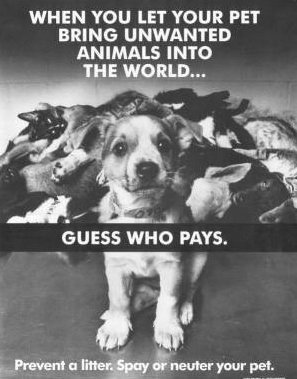SPAY/NEUTER INFO
What Are the Health Benefits of Spaying and Neutering?
Spayed dogs are less likely to develop breast cancer and will not be at risk for ovarian or uterine tumors. Neutered male dogs will not get testicular cancer and they will have a decreased chance of developing prostate enlargement. By neutering male dogs, you lessen their desire to roam, thus decreasing their risk for injury and transmission of infectious disease.
Why Should I Spay or Neuter My Dog?
In addition to the many health benefits, spaying or neutering your dog ensures that he or she won’t contribute to the pet overpopulation problem. Even an unsterilized dog who lives primarily indoors may escape or break away from a leash on a walk and could mate and produce puppies. Each year, millions of homeless dogs are euthanized or end up in shelters simply due to a lack of good homes.
What Are Some Behavioral Issues Associated with Dogs Who Aren’t Spayed or Neutered?
Both male and female dogs will show general behavior signs such as howling, barking and urine marking. There is also a strong need to roam and find a mate, often leading to fighting.
The Optimum age to Spay/Neuter is 1 - 2 yrs of age. Never do before age 6 months. If a large breed dog, especially a Rottweiler you should wait till at least age 2 - 3yrs . (For more info click here)
Never give shots of any kind one month either side of any surgery including spay or neutering!
NEWS FLASH! (read here) A NEW AND MAYBE BETTER WAY TO SPAY
SPAY AND NEUTER: EXCUSES, MYTHS. . . AND FACTS
"It's better to have one litter first." Medical evidence indicates just the opposite. In fact, the evidence shows that females spayed before their first heat are typically healthier. Many veterinarians now sterilize dogs and cats as young as eight weeks of age. Check with your veterinarian about the appropriate time for these procedures.
"But my pet is purebred." So is at least one out of every four pets brought to animal shelters around the country. There are just too many dogs and cats—mixed breed and purebred.
"I want my dog to be protective." Spaying or neutering does not affect a dog's natural instinct to protect home and family. A dog's personality is formed more by genetics and environment than by sex hormones.
"I don't want my male dog or cat to feel like less of a male." Pets don't have any concept of sexual identity or ego. Neutering will not change a pet's basic personality. He doesn't suffer any kind of emotional reaction or identity crisis when neutered.
"It's too expensive to have my pet spayed or neutered." The cost of spaying or neutering depends on the sex, size, and age of the pet, your veterinarian's fees, and a number of other variables. But whatever the actual price, spay or neuter surgery is a one-time cost—a relatively small cost when compared to all the benefits. It's a bargain compared to the cost of having a litter and ensuring the health of the mother and litter; two months of pregnancy and another two months until the litter is weaned can add up to significant veterinary bills and food costs if complications develop. Most importantly, it's a very small price to pay for the health of your pet and the prevention of the births of more unwanted pets.
"I'll find good homes for all the puppies and kittens." You may find homes for all of your pet's litter. But each home you find means one less home for the dogs and cats in shelters who need good homes. Also, in less than one year's time, each of your pet's offspring may have his/her own litter, adding even more animals to the population. The problem of pet overpopulation is created and perpetuated one litter at a time.
SOMETIMES THERE'S JUST
TOO MUCH OF A GOOD THING. . .
then there's a problem. In the case of dogs and cats, the problem is pet overpopulation. Each year between eight and twelve million dogs, cats, puppies, and kittens end up at animal shelters around the country. Some are lost, some are abandoned, some are unwanted, most are the result of irresponsible pet ownership. Sadly, between four and six million of them must be euthanized because there aren't enough homes for them all.
Consider these facts:
WHAT DOES PET OVERPOPULATION
HAVE TO DO WITH ME?
Just about everything. It's hard to imagine that letting your pet have one—or even two—litters causes a problem, especially if you find homes for most of your pet's puppies or kittens. But the fact is that "just one litter" does cause pet overpopulation. In less than a year, all of the little ones in your pet's litter could be having litters of their own. Every day, thousands of healthy puppies and kittens must be euthanized—and each one of those thousands came from "just one litter."
PET OVERPOPULATION IS A
PROBLEM YOU CAN HELP SOLVE
Fortunately, there is a solution to pet overpopulation: routine surgical procedures called spaying and neutering that will sterilize your pet. Being a responsible pet owner means choosing spay or neuter surgery for your pet—it means making a choice that saves lives. Talk to your veterinarian about spaying and neutering. Prevent a litter and be a part of the solution to the tragedy of pet overpopulation.

(above info courtesy of http://www.hsus.org)
